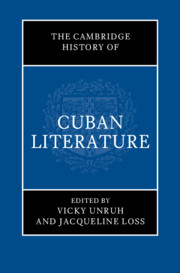Book contents
- The Cambridge History of Cuban Literature
- The Cambridge History of Cuban Literature
- Copyright page
- Dedication
- Contents
- Figures
- Contributors
- Acknowledgments
- Introduction Unfinished Histories
- Part I Literature in the Early Colony
- Part II Cuban Literature’s Long Nineteenth Century
- Part III Literary and Intellectual Culture in the Twentieth-Century Republic
- 13 The Literary Intellectuals of the Early Cuban Republic
- 14 The Invention of the Black Cuban in the Early Twentieth Century
- 15 The Fluid Expressive Communities of Cuba’s Interwar Avant-Gardes
- 16 Lydia Cabrera and Afro-Caribbean Imaginaries
- 17 The Fictions of New Urban Subjects
- 18 The Esthetics of Dulce María Loynaz
- 19 José Lezama Lima and the Orbits of Orígenes
- 20 Alejo Carpentier and Cuba’s Literary Twentieth Century
- 21 The Weighted Literary Islands of Virgilio Piñera
- Part IV The Revolution’s Literary-Cultural Initiatives and Their Early Discontents
- Part V Cuba and Its Diasporas into the New Millennium
- Epilogue
- Select Bibliography
- Index
- References
16 - Lydia Cabrera and Afro-Caribbean Imaginaries
from Part III - Literary and Intellectual Culture in the Twentieth-Century Republic
Published online by Cambridge University Press: 31 August 2024
- The Cambridge History of Cuban Literature
- The Cambridge History of Cuban Literature
- Copyright page
- Dedication
- Contents
- Figures
- Contributors
- Acknowledgments
- Introduction Unfinished Histories
- Part I Literature in the Early Colony
- Part II Cuban Literature’s Long Nineteenth Century
- Part III Literary and Intellectual Culture in the Twentieth-Century Republic
- 13 The Literary Intellectuals of the Early Cuban Republic
- 14 The Invention of the Black Cuban in the Early Twentieth Century
- 15 The Fluid Expressive Communities of Cuba’s Interwar Avant-Gardes
- 16 Lydia Cabrera and Afro-Caribbean Imaginaries
- 17 The Fictions of New Urban Subjects
- 18 The Esthetics of Dulce María Loynaz
- 19 José Lezama Lima and the Orbits of Orígenes
- 20 Alejo Carpentier and Cuba’s Literary Twentieth Century
- 21 The Weighted Literary Islands of Virgilio Piñera
- Part IV The Revolution’s Literary-Cultural Initiatives and Their Early Discontents
- Part V Cuba and Its Diasporas into the New Millennium
- Epilogue
- Select Bibliography
- Index
- References
Summary
This chapter unpacks the relationship between the ethnographic and literary work of Lydia Cabrera, which draws extensively on Black Cuban informants, and work by generators of Afro-Caribbean imaginaries, including Francophone writers Aimé Césaire and Suzanne Césaire and Anglophone writers Sylvia Wynter and Edward Kamau Brathwaite, in order to show that these writers’ distinct approaches to translation illuminate their diverse contributions to these imaginaries. After analyzing the roles of authorship and translation in Cabrera’s fiction and nonfiction, the chapter showcases her choices in translating Aimé Césaire and her impact on his and Suzanne Césaire’s translation of Léo Frobenius’s ethnographic work. These activities are then compared with the work of Wynter and Brathwaite, teasing out Cabrera’s contributions to dismantling the racial hierarchies produced by colonialism and slavery, while at the same time signaling ways in which she reproduced the communicative inequality of that legacy.
Keywords
- Type
- Chapter
- Information
- The Cambridge History of Cuban Literature , pp. 263 - 275Publisher: Cambridge University PressPrint publication year: 2024

